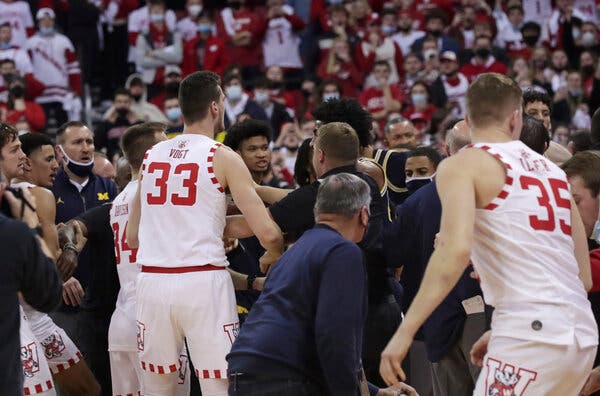GG’s Andrew Jarrell provides post-game analysis on mitigating a crisis after an unfortunate incident at a basketball game between the Universities of Michigan and Wisconsin.

After a relatively uneventful game between the University of Michigan’s and University of Wisconsin’s men’s basketball teams, a brawl broke out. As the coaches approached each other for the customary post-game handshake, Michigan’s coach, Juwan Howard, attempted to walk by the opposing coach without shaking hands. In response, Wisconsin’s coach, Greg Gard, held Howard and tried to confront him. Pushing and shoving ensued, resulting in Howard striking one of Wisconsin’s assistant coaches in the face. From there a fight briefly broke out with the players jumping in.
What Howard, and Gard to a lesser extent, did was not okay. The communications response after the fact was also lacking. Here’s what went wrong.
Whether you’re an individual or company, when you have done something wrong, it is essential to take responsibility swiftly. Howard and the University of Michigan did not follow this approach. Instead, during his post-game press conference, Howard was extremely defensive. It took another two days before he finally issued a statement and apology. While Michigan’s athletic director did release a statement the night of the incident, he and the University chose not to announce a punishment for Howard, instead waiting for the Big Ten League to dole out discipline. With Howard failing to apologize and Michigan failing to announce clear action, they left a vacuum for critics to take control of the narrative. Sports writers and fans flocked to social media to express their dismay at what happened and speculate on Howard’s punishment. While criticism was inevitable, Howard and Michigan could have quelled much of the discussion and speculation by taking control of the narrative themselves with a clear apology and response. In not responding quicker, they also prolonged the story, generating another around of articles and commentary tied to Howard’s apology.
When rectifying and mitigating a crisis, it’s important to take sufficient action relative to the wrong committed. The Big Ten decided to suspend Howard for the remainder of the season, which most reasonable observers felt was appropriate. However, they decided not to suspend Gard, opting instead for a fine. Many have rightfully criticized the League for this decision, resulting in more negative press on the matter.
While Howard’s tone was initially defensive, his eventual apology was appropriately contrite. On the other hand, the final statement from Wisconsin’s athletic director was wildly inappropriate. In it, he claimed his staff and students were trying to “de-escalate the situation” and expressed no regret for Gard’s actions. This utter lack of self-awareness only led to further criticism of Gard and Wisconsin.
What happened at the close of the game was objectively horrible and no press strategy will change that. But both universities failed in mitigating the crisis, missing opportunities with their communications to take responsibility and lessen the reputational damage.